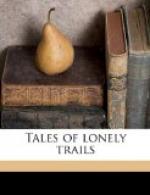Nothing happened. For hours and hours I sat there, with frequent intermissions away from my hard, rocky seat. Toward the close of afternoon, when the wind began to get cold, I saw that R.C. had left his stand. He had undoubtedly gone back to camp, which was some miles nearer his stand than mine. At last I gave up any hope of hearing either the hounds or the horn, as the roar of wind had increased. Once I thought I heard a distant rifle shot. So I got on my horse and set out to find camp. I was on a promontory, the sides of which were indented by long ravines that were impassable except near their heads. In fact I had been told there was only one narrow space where it was possible to get off this promontory. Lucky indeed that I remembered Haught telling of this! Anyway I soon found myself lost in a maze of forested heads of ravines. Finally I went back to the rim on the west side, and then working along I found our horse-tracks. These I followed, with difficulty, and after an hour’s travel I crossed the narrow neck of the promontory, and back-tracked myself to camp, arriving there at sunset.
The Haughts had put up two bear. One bear had worked around under one of the great promontories. The hounds had gotten on his back-trail, staying on it until it grew cold, then had left it. Their baying had roused the bear out of his bed, and he had showed himself once or twice on the open rock-slides. Haught saw the other bear from the rim. This was a big, red, cinnamon bear asleep under a pine tree on an open slope. Haught said when the hounds gave tongue on the other trail this red bear awakened, sat up, and wagged his head slowly. He had never been chased by hounds. He lay down in his piny bed again. The distance was too great for an accurate shot, but Haught tried anyway, with the result that he at least scared the cinnamon off.
These bear were both thin. As they were not the sheep-killing and cow-killing kind their food consisted mainly of mast (acorns) and berries. But this season there were no berries at all, and very few acorns. So the bears were not fat. When a bear was thin he could always outrun the hounds; if he was fat he would get hot and tired enough to climb a tree or mad enough to stop and fight the dogs.
Haught told me there were a good many mountain lions and lynx under the rim. They lived on elk, deer, and turkey. The lynx were the tuft-eared, short-tailed species. They would attack and kill a cow-elk. In winter on the rim the snow sometimes fell fifteen feet deep, so that the game wintered underneath. Snow did not lay long on the sunny, open ridges of the basin.




